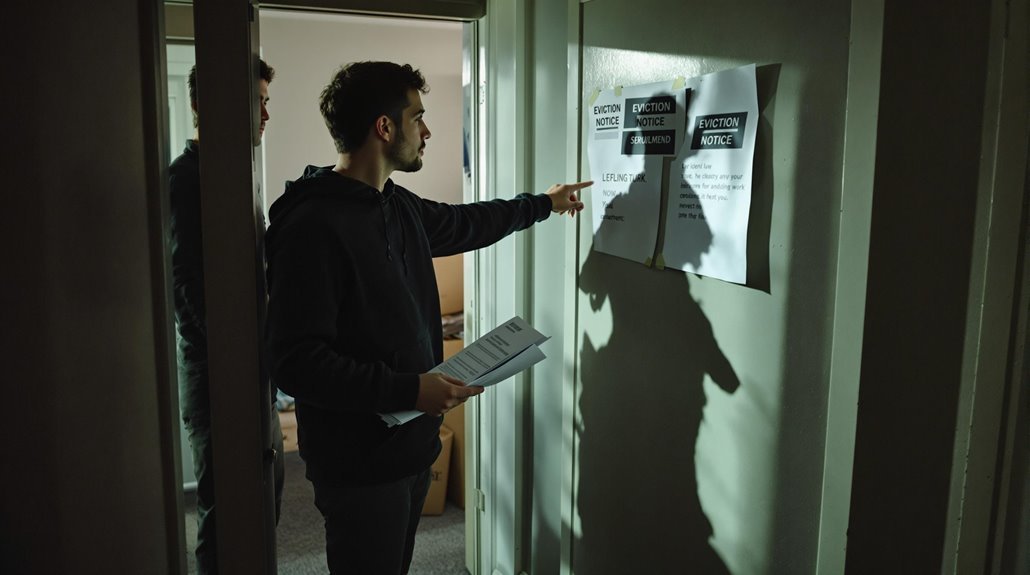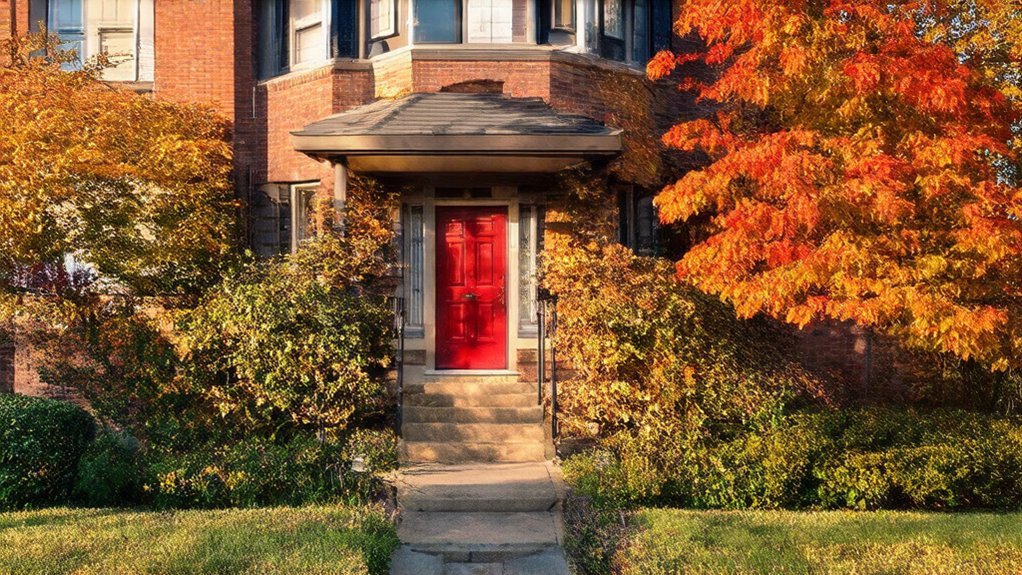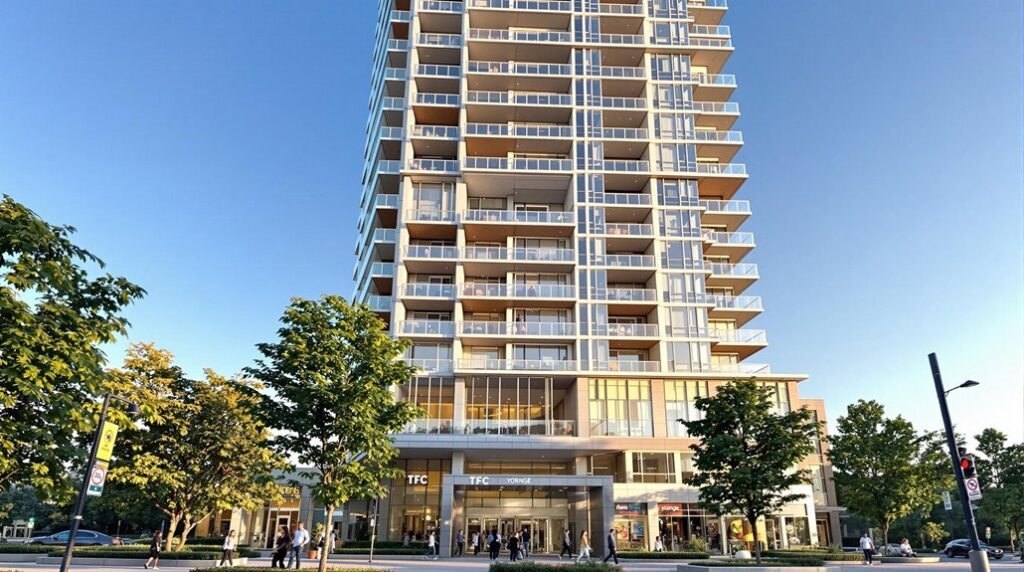In Toronto, you’ll need to understand your rights during the eviction process. Landlords must provide proper notice using official LTB forms, with notice periods ranging from 10 to 120 days depending on circumstances. You have 14 days to respond to eviction notices and can challenge them at LTB hearings. Common eviction grounds include non-payment of rent, property damage, and disruptive behavior. Keep all documentation and gather evidence to support your case. Free legal assistance is available through community clinics and Legal Aid Ontario. The complete eviction process involves specific steps and requirements that can greatly impact your tenancy outcome.
Key Takeaways
- Landlords must provide written notice using official LTB forms, with notice periods ranging from 10 to 120 days depending on eviction grounds.
- North York tenants have 14 days to respond to eviction notices and should immediately gather evidence and verify notice legitimacy.
- Only the Sheriff can physically remove tenants after an LTB eviction order; landlords cannot change locks or remove belongings themselves.
- Free legal assistance is available through community legal clinics and Legal Aid Ontario for North York residents facing eviction.
- Tenants can halt eviction proceedings for non-payment by paying all outstanding rent before the termination date on the notice.
Understanding Legal Grounds for Eviction
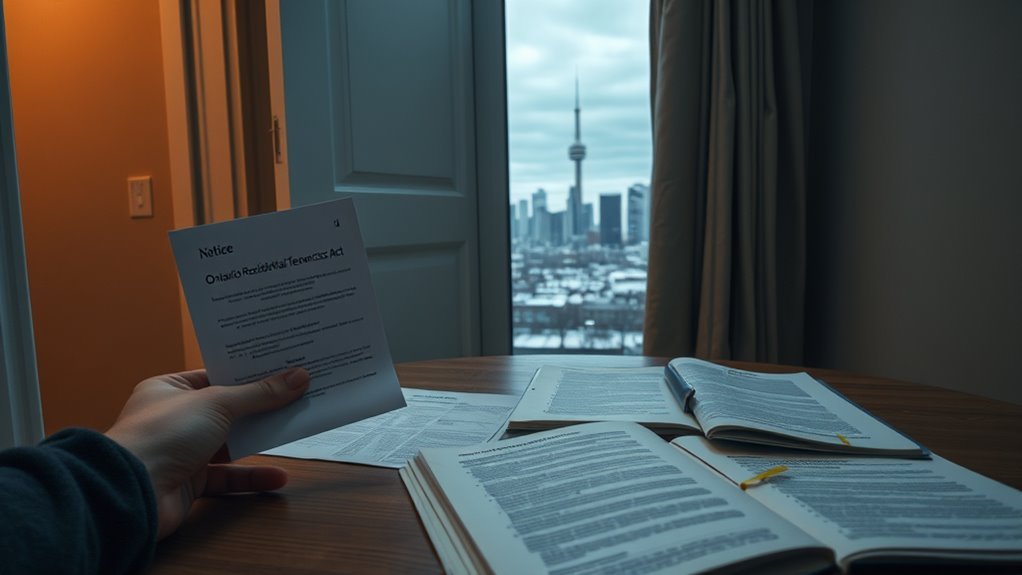
When facing eviction in North York, you’ll need to understand the legal grounds that landlords can use to end your tenancy. The law recognizes several valid reasons for eviction that protect both landlord and tenant rights. Tenants have the right to contest any eviction proceedings in court by presenting evidence and defenses.
Non-payment of rent is the most common grounds for eviction. You must pay your rent by midnight on the due date. Your landlord can start the eviction process if you fail to pay on time. However, you’ll have an opportunity to pay the overdue amount to stop the eviction. Form N4 gives tenants 14 days to pay all rent owed.
Property damage and disruptive behavior form another basis for eviction. Your landlord can seek eviction if you:
- Cause unreasonable damage beyond normal wear and tear
- Create unsafe conditions for other tenants
- Engage in seriously disruptive behavior
Illegal activities on or near the property will lead to immediate eviction action. If you’re involved in criminal behavior like drug dealing, your landlord won’t need to provide advance notice before applying to the Landlord and Tenant Board (LTB).
The final major ground for eviction involves owner or family occupancy. Your landlord can end your tenancy if:
- They need the unit for personal use
- Their immediate family requires the unit
- They can prove genuine need to the LTB
In all cases except illegal activities, you’ll receive formal notice and can respond to the eviction application. The LTB will review the evidence and determine if the eviction is justified. They’ll set a move-out date if they approve the eviction.
Notice of Termination Requirements
Before starting an eviction in North York, your landlord must provide you with a proper Notice of Termination using official Landlord and Tenant Board (LTB) forms. The notice must clearly explain when and why you’re being asked to leave the property. Your landlord can’t skip this step or use unofficial forms to start the eviction process. Mutual agreements to end tenancy early require completing Form N11 for proper documentation. Similar to employment law, you may be entitled to reasonable notice depending on your specific circumstances.
The amount of notice you’ll receive depends on the reason for eviction:
- You’ll get 14 days’ notice if you haven’t paid rent or consistently pay late.
- Lease agreement violations require 10 to 20 days’ notice.
- Weekly tenants receive 28 days’ notice.
- Long-term lease terminations need 30 to 120 days’ notice.
- The notice must include specific details about your tenancy.
- Your landlord must use the correct LTB form for the situation.
- All information on the form needs to be accurate and complete.
After you receive the notice, you have options. You can fix the problem if it’s about unpaid rent or lease violations. You can also move out voluntarily or challenge the eviction.
If you don’t respond or resolve the issue within the notice period, your landlord can file an eviction application with the LTB.
The LTB will then schedule a hearing where your landlord must prove their case. Your landlord needs to bring evidence and documentation to support the eviction request.
You’ll have the right to attend this hearing and present your side of the situation.
Your Rights as a Tenant
North York tenants must know their fundamental rights under Ontario’s Residential Tenancies Act (RTA) to stand up against unfair evictions.
You’re protected by specific legal safeguards that prevent landlords from carrying out unauthorized evictions.
The Ontario Human Rights Code ensures your right to fair treatment throughout the eviction process.
Your key rights during the eviction process include:
- You can’t be evicted without a valid reason such as non-payment of rent, property damage, or illegal activities.
- You don’t have to leave immediately after receiving an eviction notice.
- You’re entitled to a hearing at the Landlord and Tenant Board (LTB).
- You can get help from legal aid clinics and translation services.
- Your landlord must inform you about available legal aid services.
The law strictly prohibits landlords from:
- Changing locks without proper authorization.
- Removing your belongings from the unit.
- Shutting off essential services.
- Forcing you to leave without an LTB order.
- Harassing you to make you move out.
You can defend yourself by:
- Attending your LTB hearing to present your case.
- Bringing evidence to support your position.
- Challenging invalid eviction notices.
- Getting legal representation if needed.
- Filing complaints about improper eviction practices.
If you receive an eviction notice, you don’t need to panic.
Notice periods can range from 7 to 60 days depending on the eviction reason.
Wait for the official LTB hearing and order before taking action.
Document everything and keep copies of all notices and communication with your landlord.
You can stay in your unit until the Sheriff enforces a valid eviction order.
Responding to Eviction Notices
Receiving an eviction notice can feel overwhelming, but understanding how to respond effectively puts you in a stronger position to protect your rights. You must first verify that the notice meets legal requirements. All eviction notices in Toronto must be written documents delivered in person or by mail. For non-payment of rent cases, your landlord must use Form N4. Self-help evictions by landlords, like changing locks without proper notice, are strictly prohibited by law.
You’ll have 14 days to respond to most eviction notices. During this time you should document everything and gather evidence for your case. Remember that an eviction notice isn’t a final order. You don’t need to move out immediately. If you’ve received an N4 notice for unpaid rent, you can stop the eviction process by paying the amount owed before the termination date. Tenants typically have 11 days to relocate after receiving an eviction order for non-payment.
Key steps to protect your interests:
- Get a receipt if you make any rent payments
- Check the notice’s validity against RTA guidelines
- Contact Legal Aid Ontario or a tenant association for advice
The landlord must file an application with the Landlord and Tenant Board if you don’t comply with the notice. You’ll receive a hearing notice by mail or email. At this point you can prepare your defense and attend the hearing.
Only a Sheriff can enforce an actual eviction order. If you disagree with the LTB’s decision, you have 30 days to request a review or file an appeal. Always keep copies of all documents and maintain detailed records of all communications with your landlord.
Preparing for LTB Hearings
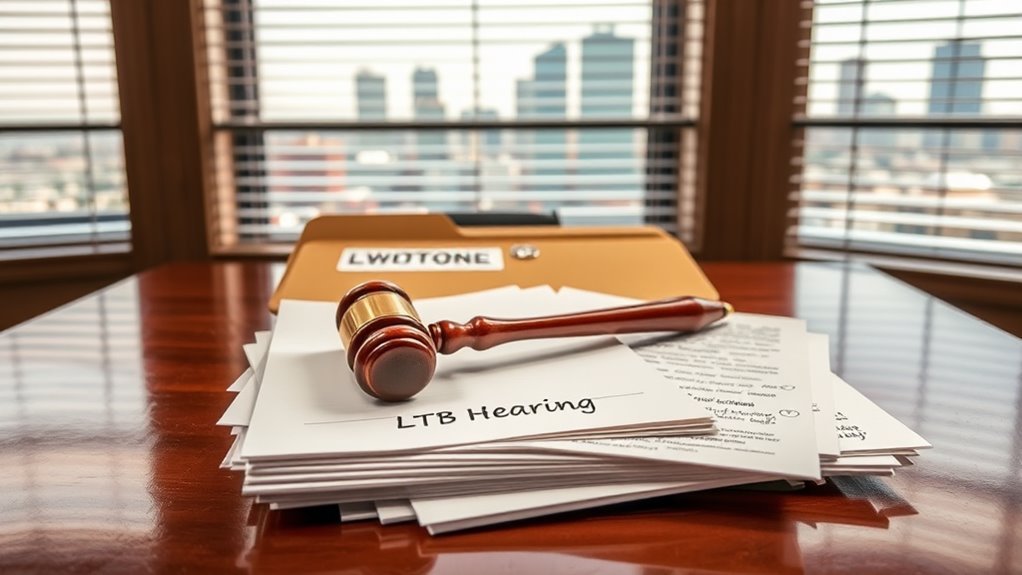
Getting ready for your Landlord and Tenant Board hearing requires careful organization and thorough preparation. You’ll need to gather all essential documents including your rental agreement, payment receipts, and any communication with your landlord.
Take photos of relevant issues and organize your evidence in a clear order. Make certain to date and sign all necessary paperwork. Local tenant advocacy groups can assist with evidence collection.
Understanding the hearing format is vital for success. The LTB offers three types of hearings: mediation, formal hearings, and written hearings. You can attend either remotely through Zoom, by telephone, or in person. Missing a hearing could result in an automatic eviction order.
If you can’t attend, you must arrange for someone to represent you or request a new date.
Follow these steps to prepare for your hearing:
- Collect and organize all documentation
- Prepare witness statements if applicable
- Request any needed accommodations like translation services
- Test your internet connection for remote hearings
- Download Zoom ahead of time if attending virtually
Seek legal assistance early in the process to strengthen your case. You can use CLEO’s Eviction Solution Explorer to help build your defense and create speaking notes.
For remote hearings, make sure you have a quiet space and working equipment.
Remember these important points:
- Submit accommodation requests as soon as possible
- Arrive early whether attending in person or online
- Have all documents readily accessible
- Enable your camera and microphone for virtual hearings
- Know that the LTB’s decision will be legally binding
Common Defense Strategies
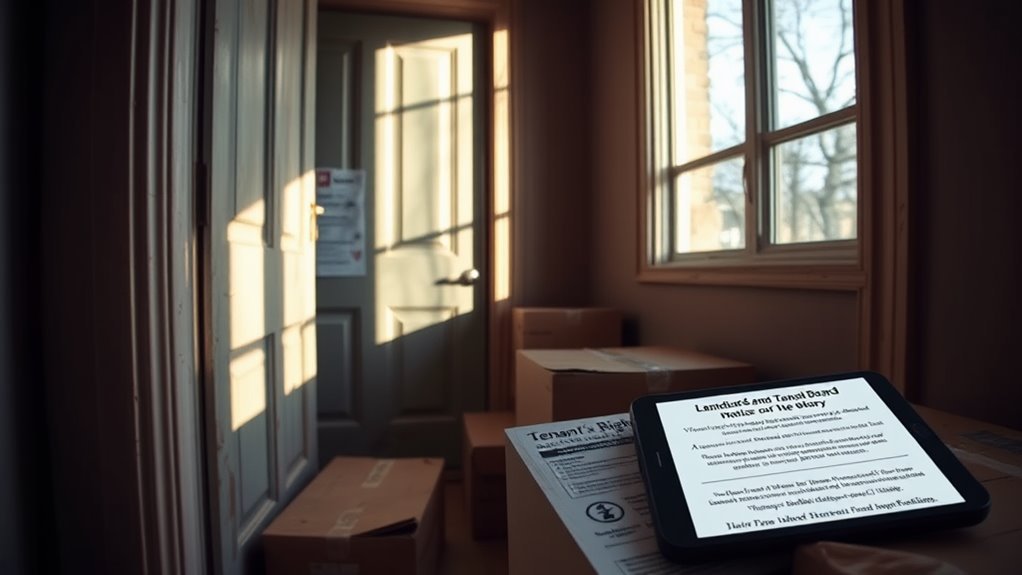
Once you’ve prepared for your LTB hearing, you’ll need a solid defense strategy to protect your rights as a tenant. The law provides several effective ways to challenge evictions and unfair rent increases. You can start by gathering evidence and documentation to support your case. Maintaining comprehensive records of all communications and payments with your landlord will strengthen your position.
Your defense strategy should focus on these key elements that the LTB must consider:
- Your history as a tenant including payment records and property maintenance
- Any circumstances that affected your ability to pay rent on time
- Documentation of attempts to resolve issues with your landlord
You have the right to request mediation services through the LTB before proceeding to a formal hearing. If you’re facing financial challenges, you can connect with the City’s eviction prevention office to explore payment solutions. Toronto Community Housing considers eviction as last resort after exploring all other available options.
The Board must consider all relevant circumstances before making an eviction decision.
Legal support is available to help strengthen your defense. You can access free legal clinics and duty counsel services at the LTB. These professionals can help identify potential violations of your housing rights and develop appropriate defense strategies.
Remember that rent increases over 5% must be justified by your landlord.
If you receive an unfavorable decision, you can request relief from eviction under subsection 83(1) of the RTA. The Board may delay or refuse eviction based on factors like school displacement or health conditions.
You might also qualify for a stay of execution to extend your time in the property while seeking alternative housing arrangements.
Navigating the Appeal Process
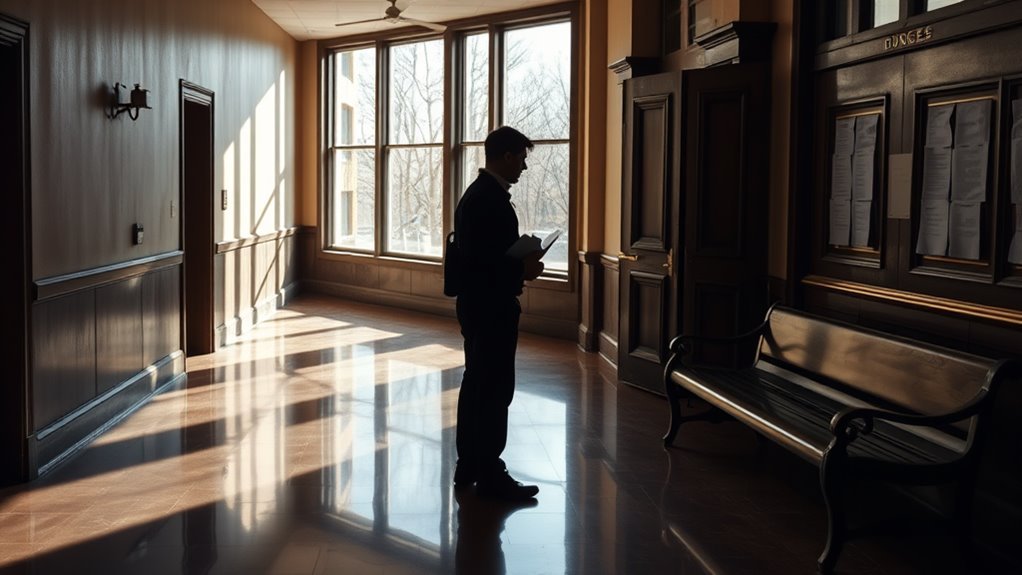
After an unfavorable LTB decision, you have the right to appeal within 30 days through Ontario’s Divisional Court. You can only appeal on questions of law. During the pandemic, tenants were often facing eviction for non-COVID related issues. The good news is that filing an appeal automatically puts a stay on your eviction order.
To start your appeal, you’ll need to follow these steps:
- File a Notice of Motion for Leave to Appeal within 15 days of receiving the LTB order.
- Serve this notice to all respondents.
- Submit your court documents within 5 days after service.
- Prepare and file your motion record, factum, and any needed transcripts within 30 days.
Your appeal package must include:
- Appellant’s Factum (your legal arguments)
- Appeal Book and Compendium (key documents)
- Exhibit Book (supporting evidence)
You’ll need to upload all materials to the court system at least four weeks before your hearing date. The respondent will have 15 days to file their response materials for statutory appeals requiring leave. You must obtain representation from a licensed lawyer since paralegals cannot represent clients in appeals.
The Divisional Court has broad powers to handle your appeal. They can:
- Affirm the original LTB decision
- Rescind the eviction order
- Vary the terms of the order
- Order a new hearing
- Make any other decision they consider just
Remember that the court can dismiss your appeal if they find it’s an abuse of process. If this happens, they’ll lift the stay on your eviction order and you’ll need to move out immediately.
Moving Out Procedures
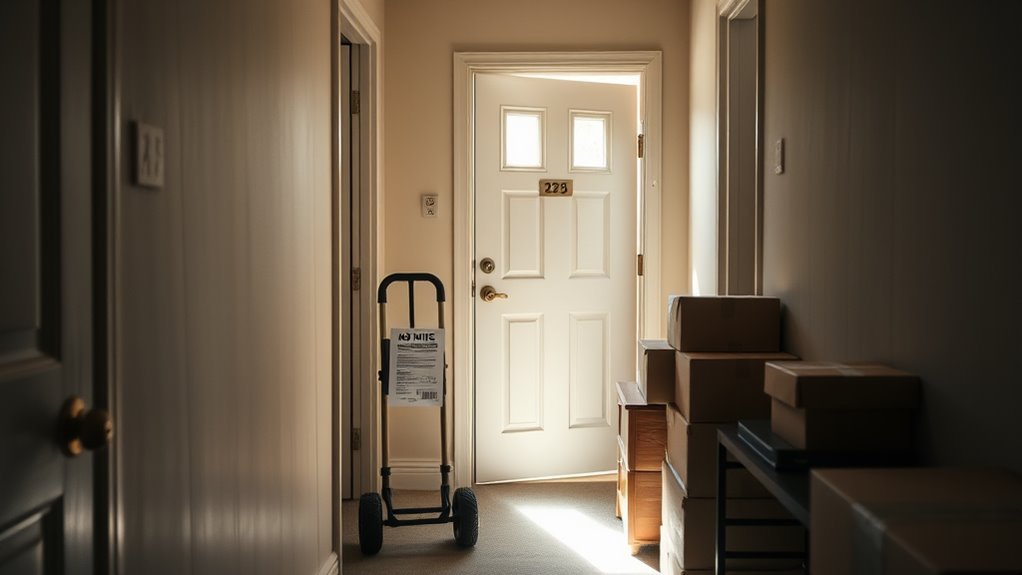
Moving out of your North York rental property requires careful planning and adherence to specific legal procedures. You’ll need to understand the proper steps whether you’re leaving due to a notice of termination or through a mutual agreement with your landlord.
If you’ve received a Notice of Termination, you don’t have to move out immediately. The notice period ranges from 7 to 60 days based on the eviction reason. You can choose to comply with the notice or dispute it through the Landlord and Tenant Board (LTB). Tenants should know that legal aid services are available to help navigate eviction proceedings.
- Keep all documentation including notices, agreements, and correspondence with your landlord.
- Take photos of the property’s condition before you leave.
- Get written confirmation of your move-out date from your landlord.
You can also end your tenancy through a mutual agreement with your landlord. This requires a written document signed by both parties specifying your move-out date. Once you’ve agreed to a date, you must leave by then unless your landlord approves an extension.
If you’d like to transfer your lease to someone else, you can request an assignment. This differs from subletting and needs landlord approval. The new tenant must accept your original lease terms. You’ll typically be released from your obligations after the assignment is approved.
Remember that if disputes arise, only the Sheriff can physically remove you from the property – and only after the LTB has issued an eviction order. Your landlord can’t change locks or remove your belongings without proper legal authority.
Seeking Legal Assistance
Legal help is readily available if you’re facing eviction in North York. You can access free legal assistance through community legal clinics if you have a low income. Contact Legal Aid Ontario at 1-800-668-8258 to find your local clinic. These clinics will help you with forms, provide advice, and assist you at hearings. TTY users can reach support through Bell Relay Service at 1-800-855-0511.
The Eviction Prevention Handbook provides comprehensive guidance in multiple languages for Toronto renters facing housing challenges.
You’ll find several key resources to support your case:
- Tenant Duty Counsel (TDC)
- Sign up at tdc.acto.ca
- Get basic advice about eviction
- Receive help with settlements
- Access assistance during LTB hearings
- Pro Bono Ontario Services
- Call 1-855-255-7256
- Get 30 minutes of free legal advice
- Discuss your specific situation
- Learn about your rights and options
- Online Resources
- Visit CLEO’s Steps to Justice website
- Access forms and checklists
- Find referrals to legal services
- Get step-by-step guidance
Before your LTB hearing, you’ll need to:
- Connect with a legal representative
- Submit evidence seven days in advance
- Request any needed accommodations
- Prepare your case presentation
You can arrange virtual hearings unless you have human rights concerns or technology access issues. Your local community legal clinic can connect you with additional support services.
Remember to seek legal advice before and after your hearing, especially if you’re considering an appeal of the LTB’s decision.
Conclusion
Understanding Toronto’s eviction laws will help protect your rights as a North York tenant. You’ll need to know proper notice periods, valid grounds for eviction, and how to respond effectively to termination notices. Keep detailed records and don’t hesitate to seek legal help when needed. The Landlord and Tenant Board exists to guarantee fair treatment, so make full use of their resources and procedures throughout the eviction process.


